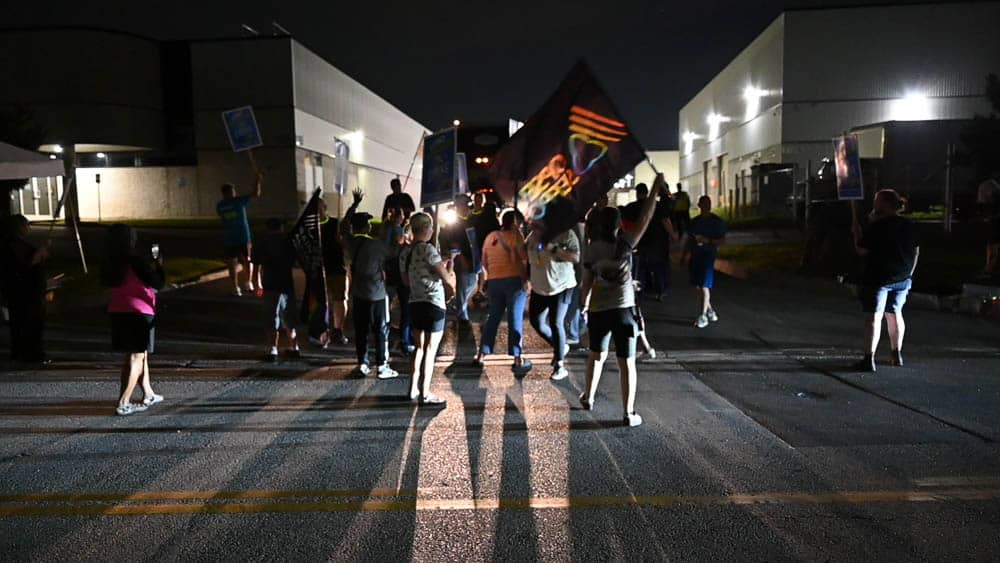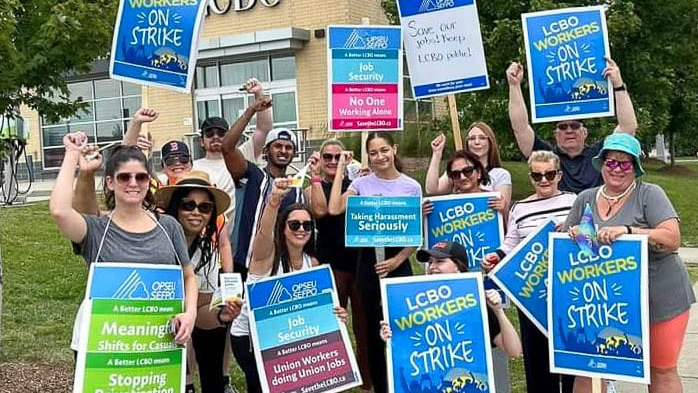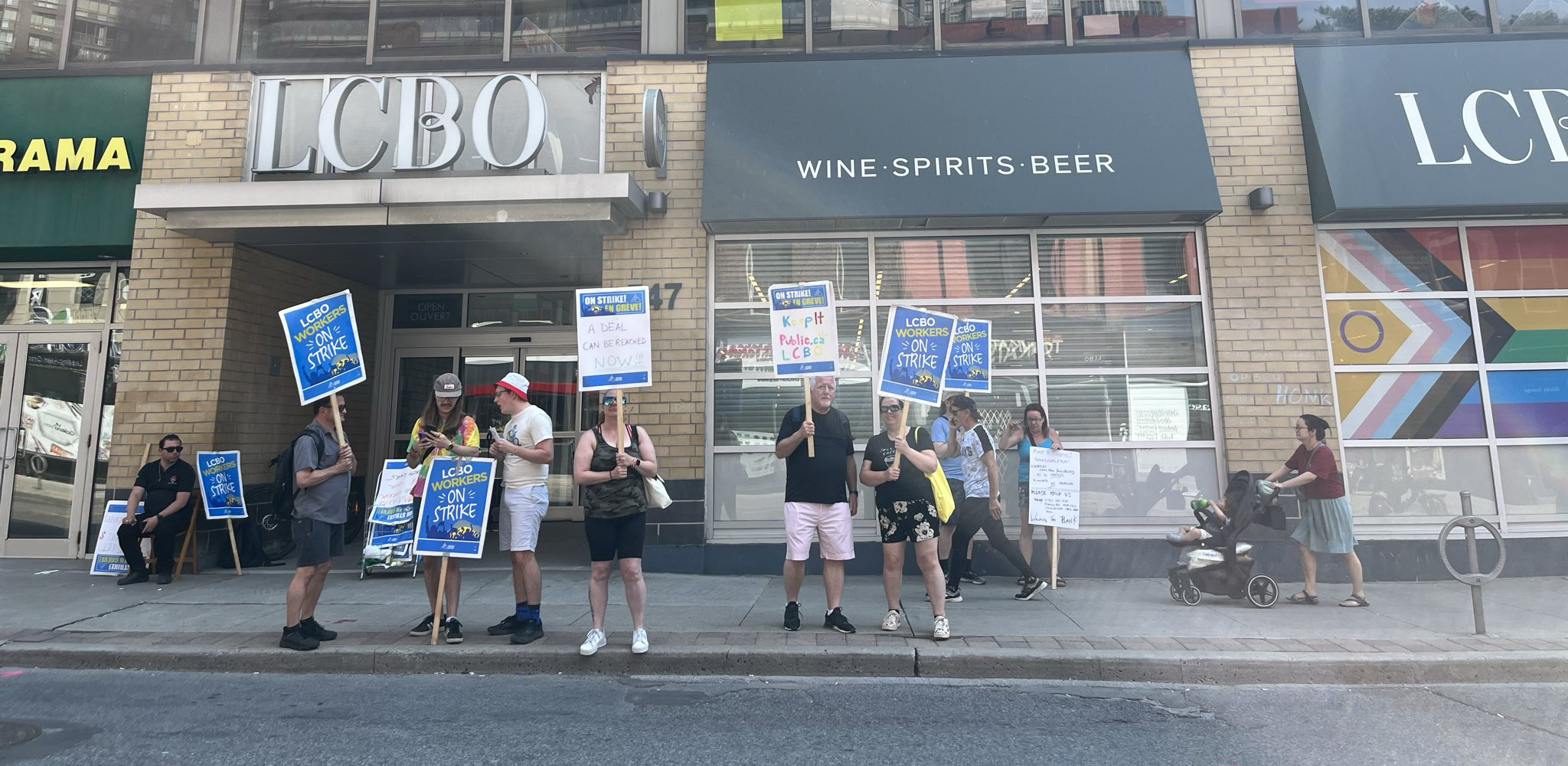Pending ratification, LCBO workers could end their first ever strike after 15 days. On Saturday, July 20, workers began voting on the adoption of the tentative deal proposed by the LCBO and OPSEU. After accusations of bad faith were made between the Union and Crown Corporation on Friday, the tentative deal almost collapsed prior to a ratification vote.
Dave Morrison, Chief Steward at Local 165, told North Star on Saturday afternoon that workers started voting on the agreement "at 10am this morning, and it finishes tomorrow at 3pm."
The deal includes provisions for an 8% wage increase over 3 years—not enough to regain wages lost from the inflation crisis—the conversion of 1000 casual employees (almost 15% of them) to permanent part-time positions, and improved access to benefits for casual employees.
Casuals are 70% of LCBO employees and are not guaranteed work hours. They are only entitled to "pay when [they're] there," Barry, an LCBO worker in Sauble Beach, told North Star. After working 17 years, Barry is only granted "a small percentage on [his] salary that covers sick days and that benefits vacation." Casual workers are denied benefits until their fifth consecutive year of employment.
Notably, the agreement also includes a commitment by the LCBO to limit convenience outlets to 400 in the entire province, limit outsourcing, and increase the product volume at warehouses to serve retail outlets by 1.25 million cases.

Barry explained to North Star that the strike was well received by the general public. "We've had hundreds of people honking, waving, giving thumbs up, dropping food and water, going by, and saying thanks to us."
James, a worker at an LCBO in Mississauga, shared his experience of other workers supporting the strike: "We had support from other unions, which is fantastic. We had teachers coming out to the picket lines and helping us."
Why are LCBO Workers on Strike?
Morrison says that LCBO workers, "who are the life and blood of this organisation, are the ones that have been taken advantage of with the casualisation of their working environment. And so, one of the great things that has come out of this agreement is the 1000 permanent part-time positions that have been agreed upon."
Roshan, from a Scarborough LCBO explained that "for a lot of people who are casual, they don't work much. They maybe work five or ten hours each month. And obviously, during times when things get busy like Canada day, Christmas, and long weekends, they can get more hours. But that's very inconsistent."
In terms of benefits, Roshan paints a less than rosy picture. "You know we get the occasional 10% off the Toronto Zoo, you get a corporate phone plan... You get those little things, but you have to wait for five years. The only true benefit you get is being a part of the union. That is our biggest benefit."
Furthermore, former full time LCBO jobs have been outsourced to non-unionized contractors for warehousing, order fulfillment, data management and printing.
Additionally, Ford has created a map to help find alcohol retailers for Ontarians. Workers at the Windsor LCBO expressed disappointment with this so-called initiative. "Why doesn't Ford make a map to help Ontarians find family doctors instead? It's so upsetting to see how Ford will do anything but fight for the average Canadian."
Workers Say they are Fighting Privatization
Announcing that beer, wine, cider and ready-to-drink cocktails would be available in convenience and grocery stores in 2026, Doug Ford stated at the end of May that Ontarians "are excited they're going to enjoy the same choice and convenience as other Canadians." But is this opposition between LCBO and convenience a false dilemma?
OPSEU says that Ford's plan to orient alcohol sales towards the private sector would cost the province over a billion dollars. Noah, a worker at an LCBO in Toronto's Village area explains that their fight is "really about keeping public money in public coffers. The LCBO makes $2.5 billion every year in profits."
Noah goes on to describe the importance of LCBO revenues to the public. "If we start privatizing liquor sales, this money is going to go to the pockets of billionaires who already have more than enough money. That's what we are fighting against."

But workers on the ground are aware of the public's desire for accessibility. Barry says that the LCBO could "open more stores, we can have longer hours. [...] I think Doug Ford, he's got one agenda and that's the business world, to help all his CEO buddies, his corporate buddies. I don't think he's interested in helping us out."
Many northern areas of Ontario also have LCBO outlets attached to gas stations and convienece stores to help increase access to alcohol in remote areas. However, such outlets have yet to be implemented across the province as a whole, and the current tentative agreement limits their number. This type of agency would keep revenues in the government's pockets, but could lead to job losses if over-utilized by the government, since the employees running it are those of the private store.


